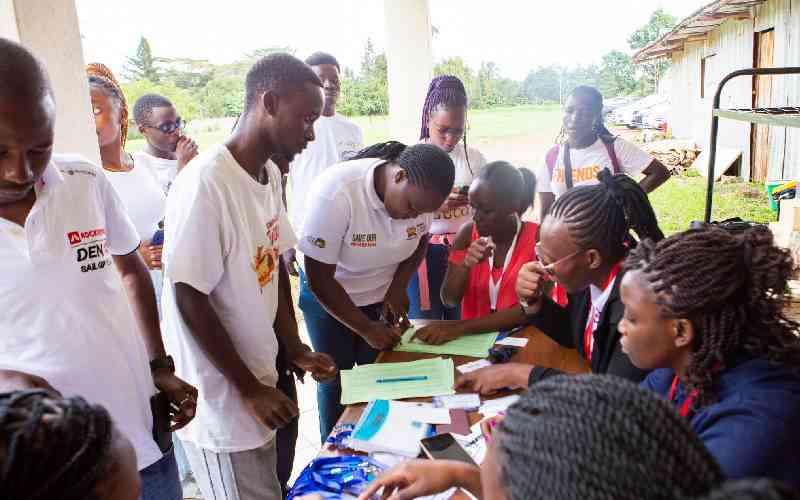 |
|
Governor James Ongwae (left) engages a trader after he launched the integrated solar lighting project in Kisii town last week. The street lights will enhance trade in the town and its suburbs. The governor aims to have a 24-hour economy. [PHOTO: ERIC ABUGA/STANDARD] |
The county government has vowed to make Kisii town a 24-hour economy.
In an effort to achieve this, things seem to be brightening up for residents and business owners in the town following the launch of the integrated street lighting programme in the town and its suburbs.
Rural Development Solutions, the company that initiated the project has completed the exercise in other counties including Nyamira and Homa Bay.
“We have an agreement with an investor who has managed to put up 200 solar powered streetlights in Kisii town’s central business district. This will go a long way in boosting security, as well as, attract investors to our region,” said Governor James Ongwae.
But even with its rich historic and attractive locations, Kisii has its fair share of challenges that give Governor Ongwae a headache as he attempts to shape one of the country’s main tourist routes.
Soapstone carvings
Dubbed the gateway of the Western Kenya Tourist Circuit that includes Tabaka soapstone carvings, Maasai Mara game reserve, Lambwe Valley game reserve and the entire Lake Victoria basin, Kisii town continues to remain behind economically.
Kisii is reeling under youth unemployment, increasing drug abuse, poor education standards, land conflicts, dilapidated roads and prostitution.
But authorities remain optimistic that they will restore the county’s former glory and even turn it into a major source of employment and a land of plenty.
Traders and boda boda operators, who used to close their businesses as early as 8pm are now able to extend their working hours till midnight.
Richard Nyabwari, a vegetable vender at Kisii Municipal Market says he now works till 11pm.
“I used to close my business at exactly 8pm due to lack of proper lighting and fear of attack from the street children,” he said.
“We are targeting a 24-hour economy and the project is a move in that direction; we want to drive away the darkness that has restricted business hours,” said John Obwoncha, the county’s Trade executive.
Obwoncha added: “The mama mbogas and boda boda operators will extend their business hours without worrying about their security.”
Rural Development Solutions Project Manager Peter Morwabe said good lighting directly deters criminal activity by increasing the sense of personal safety as well as protection of property.
Stay informed. Subscribe to our newsletter
“In order to achieve a 24-hour economy, there is need to provide adequate public lighting to industrial and residential areas, commercial centres, roads and public transport facilities,” said Mr Morwabe.
The installed solar panels have a lifespan of 25 years and the batteries can last for 50,000 hours.
 The Standard Group Plc is a
multi-media organization with investments in media platforms spanning newspaper
print operations, television, radio broadcasting, digital and online services. The
Standard Group is recognized as a leading multi-media house in Kenya with a key
influence in matters of national and international interest.
The Standard Group Plc is a
multi-media organization with investments in media platforms spanning newspaper
print operations, television, radio broadcasting, digital and online services. The
Standard Group is recognized as a leading multi-media house in Kenya with a key
influence in matters of national and international interest.
 The Standard Group Plc is a
multi-media organization with investments in media platforms spanning newspaper
print operations, television, radio broadcasting, digital and online services. The
Standard Group is recognized as a leading multi-media house in Kenya with a key
influence in matters of national and international interest.
The Standard Group Plc is a
multi-media organization with investments in media platforms spanning newspaper
print operations, television, radio broadcasting, digital and online services. The
Standard Group is recognized as a leading multi-media house in Kenya with a key
influence in matters of national and international interest.









